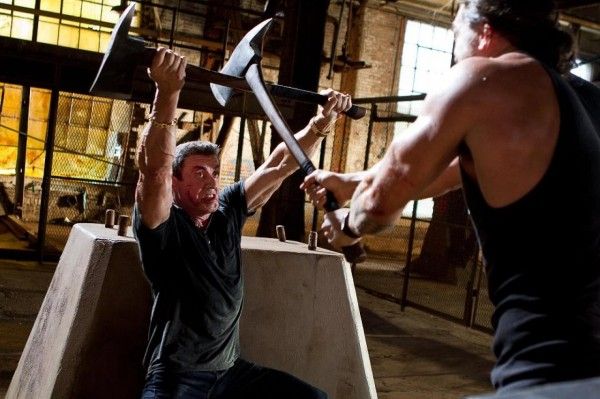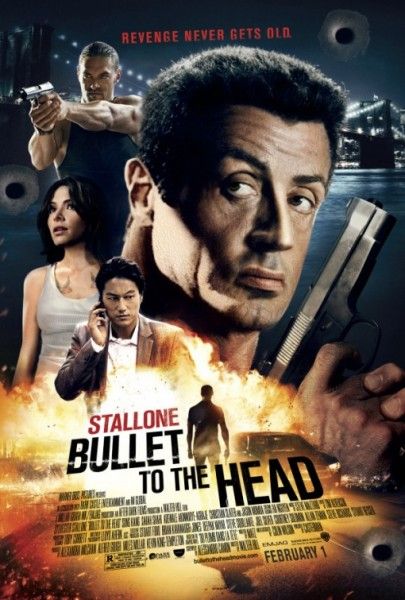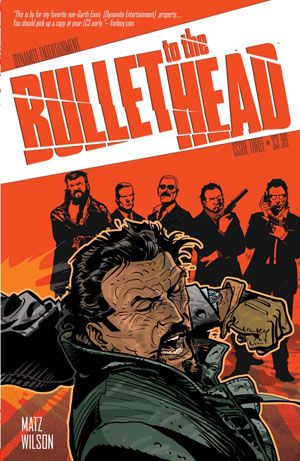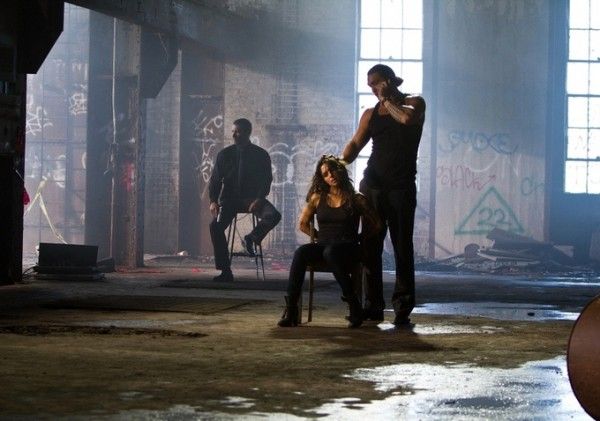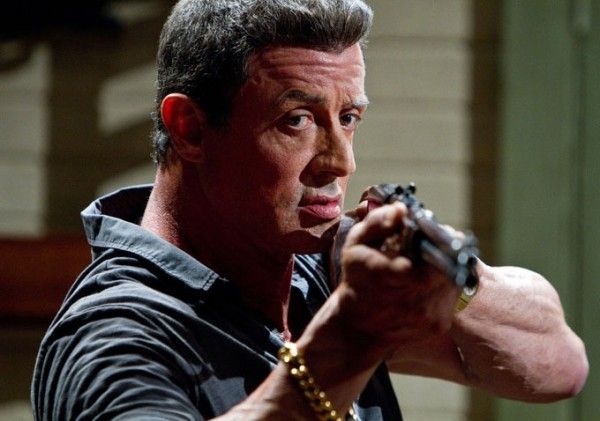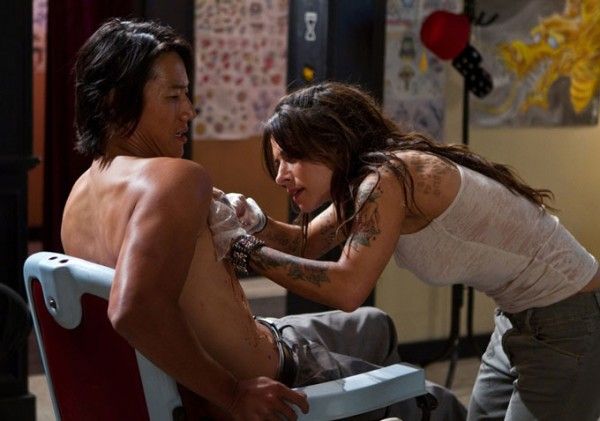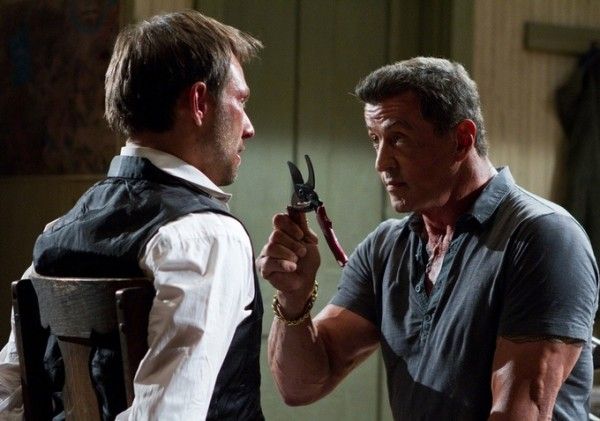If you're a movie fan, the name Walter Hill is synonymous with action classics like 48 Hours, The Warriors, Red Heat, Streets of Fire, and The Driver. Growing up, I must have watched a few of these over a dozen times, and if you had told my teenage self that one day I'd get to watch Hill direct up close, I'd never have believed you. But last year, when his new film Bullet to the Head was shooting in New Orleans, I got to visit the set along with a few other online reporters, and we saw up close the way the director likes to work. During a break in filming, we got to speak to him and he talked about collaborating with Sylvester Stallone, what drew him to this film, film versus digital, how things changed on set, how much they used the graphic novel as a template, and so much more. Hit the jump for what he had to say.
Question: You shot Hard Times here, you shot Southern Comfort out on the bayou. What's it like being back?
WALTER HILL: And Johnny Handsome with Mickey Rourke! It's nice to be able to come back.
How has it changed?
HILL: They've gone through terrible things and rebuilding. It's always been this interesting place, very different than any other American city. My social commentary on the changes within the city are best left to others. I'm happy to feel that the city is doing so well and it has made and continues to make a terrific comeback from the tragedy that happened. The other vibe you get from this is not only rebuilding, but a lot of young people are coming here. It's almost becoming what San Francisco was in the '60s. It's perceived as a place where young cats can come and do their thing. It's a low-rent city, still a bargain by most American standards, and it's an interesting place. There's a lot of street activity and there's a music scene.
You incorporate a lot of music into your movies. Will you be doing that with this one?
HILL: We're trying! I've got some Cajun music, some old time street bands, that kind of business.
How much does the character of the city bleed into the movie?
HILL: You try to use it. These things are narrative, they're character, they're thematic, but they're also atmosphere. You can use that to your advantage when you get a chance. One of the things I like about New Orleans is it feels like you're in a western with the architecture. All the balconies, the old buildings, it feels like you're in the 1880s. Some of it spills into the movie. I don't know how much of it creeps into the edges and helps you or how much of it is just by design. Usually you're trying to tell a narrative through your characters and have all this stuff bleed in around the edges.
Talk about directing Sly, who's directed himself so much. This is one of the first times in awhile where he's had a director that has not been himself, so can you talk about working with him?
HILL: I kinda surrendered. I've been trying to get him to do a movie for about 30 years and never could make it work out. He and I bumped into each other over the years, we had several meetings trying to work things out, and he and I both have the same lawyer so would see each other at various social events. He's directed about 10 movies, but anybody who's been a great star as long as he has is going to be very knowledgeable about the picture business, but I only know one way to direct. You direct him and hope for the best. He and I get along very well, I like him a lot. He's two things, a writer, producer, director, but setting all that aside he's two things: he's a very good actor and he's a star. Both those are very considerable. I think everybody understands about him being a star, but I don't think people totally appreciate how good an actor he is. Actors often get judged by material as well as their abilities, and I think he's giving a very good performance in this film. This one's a little more character-driven than some of his other dramas, but that's for you to judge, really.
What drew you into doing this film? What about the material excites you and made you step up and tackle it?
HILL: I think the biggest thing that drew me in was probably unemployment. I had just had a movie fall apart about six weeks before that I'd been trying to do for a year. It was sent to me. It wasn't the only thing that was sent to me, but it was the kind of story I thought I knew something about and thought maybe I could make a contribution to. Don't do things you can't do something with. I see wonderful movies where I'd be the first to say I couldn't have done it. I see other movies where I think, "They should have sent that one to me!"
This is a film nerd question about using Panavision cameras. Have you ever thought about going digital?
HILL: I shot a pilot digital, I've shot little portions of scenes using digital techniques and equipment as far back as Trespass which was early 90s. I shot digital stuff in Wild Bill, undisputed. The only thing all-digital was a pilot I did, and didn't find it all that considerably different. I direct the same way, though there are some differences. You make shots, you get performances…
I hear the 2nd unit was using the ARRI Alexa a little bit, but was there ever a thought to go all-digital on this?
HILL: I said something when I came on, 'cause I was under the impression they always want everything digital, and I asked, "Do you want me to shoot this digital?" They said no, one of their requirements was that I shoot it on film. No problem!
Sarah was saying you had a directing expression "too much prosciutto" that she was an offender of. Was she the worst offender on the film?
HILL: She's a very fine actress. Sometimes when people have anxiety in their desire to please you and do good have a tendency to overdo it. That's one of our jobs is to pull it back into the range that you think is appropriate to the film. She likes to act her heart out. She's a strong actress, she pairs very well, she brings a lot to it. Sometimes the very best acting is just people talking to each other. It's the old joke about don't get caught acting, if you get caught acting you're not acting very well.
Is there a director today who you think is making "Walter Hill movies" like the kind you were making in the '70s and '80s?
HILL: Well, if I thought so I wouldn't tell you. I can't think of anybody that comes immediately to mind. I never talk about any director that's alive, because the other directors I know get mad. If you praise another director, those that you don't praise say, "Why didn't you mention me?" I certainly think directors have better things to do than knock each other. There's plenty of people that get paid to knock, there's no shortage of criticism.
Often on movies things change. Dialogue gets rescripted, scenes altered. How's it been on this particular film and how has Sly, who's known as a writer, possibly influenced the way things have gone?
HILL: His basic approach and mine are not terribly different in the sense that we've got something to shoot, he's playing a character. What seemed best at somebody's desk 6 months ago doesn't necessarily apply given the scenes we've already shot and the nuances of the characters. If we find a better way to say it we change the dialogue. I make those suggestions, he makes those suggestions. He's very good at it. I don't think any of the other actors don't bring that spirit to it. I'm not one of those directors that says you've got a comma here, hit a full stop there. I don't care if I've written the dialogue I don't change the meaning, but if we find a more appropriate way to say it we do that.
On the slates it still says Headshot but the trades said it was Bullet to the Head. Is that going to stick as the final title, Bullet to the Head?
HILL: As you probably know one of the things a director has no control over is the title of the movie or the marketing or any of that business. I like the title "Bullet to the Head" a lot better than "Headshot," and it was truer to the source material, a more accurate translation, and to the best of my knowledge that's what they intend to stick with. Doesn't mean in three months someone doesn't change their mind.
How much of a template was the graphic novel?
HILL: I would say probably the general proposition of the movie is very much the graphic novel. Had there not been a graphic novel none of us would be here. A lot of the narrative concerns and approaches to character… the graphic novel is probably a little tougher and a little colder than what you're doing.
So you're not emulating it?
HILL: I would say it's a dark urban situation. I'm not consciously emulating the visual style of the graphic novel, that's fair to say.
Question: What’s the dynamic like between you and Joel Silver after all these years?
HILL: Well, there’s a question; very good. He and I are old friends, I’m very happy, I knew him a long time ago and you get into this business it’s kind of like being in the army or the service or something, you’re very close and you’re friendly with people even though some movie pulls you this way and they go that way, and you may not see them for ten years or something, not much, we’d run into each other. But I’m very pleased that Joel has become a great producer. He’s a huge success and he is, I assume you’ve all met him or interviewed him, he is a larger than life character. He is a real throwback to the old days of show business. He’s a lot of fun. He can drive you crazy. I think I probably drive him crazy. I don’t know. I’m very pleased about his success and I think he’s a lot of fun to be around. He has great energy. Somebody said once, “There’s something about Joel, when he comes into the room, you can just feel the whole vibe pick up. It’s more exciting to be around.” He just makes things more exciting. I get along very well with him, but maybe you should ask me after three or four months.
Do you have to follow his whammy formula?
HILL: He’s never presented a formula. All producers encourage you, whatever it is, to make it more-so. If you’ve got a joke, can it be funnier? If you’ve got an action sequence, can it be more exciting? That’s the nature of being a producer. And he is not an exception to the rule; if anything he demonstrates the rule. But that’s their job. He really is a producer that understands the tools of filmmaking. He’s comfortable with design and editing, sound and music. He’s very good at all those things and not all producers are. Some of them are purely entrepreneurial, and Joel is very entrepreneurial, but he also has a lot of filmmaking skills. I would like to think that some of that had something to do with working with me a long time ago, but I don’t know, he’d probably deny it. He’d probably tell you he taught me. I certainly like him very much and I very much appreciate that he came into this movie. This movie changed for the better, it straightened out a lot of problems we had when Joel came into the movie. You should talk to him about all that.
We talked to Sarah [Shahi] and Jason [Momoa] briefly about tattoos, because she plays a tattoo artist in the film, I noticed you have a beetle on your arm.
HILL: It’s actually meant to be a bumble bee but it’s so old. I got this in high school, which was now many, many years ago. In those days it was kind of- everybody’s got a tattoo now. My daughters, who I trust are sweet things, even they have a couple of tattoos. We are now in a tattoo culture.
A lot of us are film nerds and I’m sure you meet a lot of people who are film nerds, what are the one or two films off your resume that people always want to talk to you about and that you enjoy talking about?
HILL: Conversations about films are always funny. I would say a majority of people want to talk about what were the more obvious successes; the big box office films. Other people wanting to be more sensitive to you want to talk about the ones that maybe didn’t make a lot of money, but they think you might have a special feeling about. And then other people sometimes want to help you by suggesting that you should have done this or that in the movie, that that would have helped you a great deal in whatever capacity. So I just kind of role with the punches, I guess. I’m always happy to talk to somebody; it’s flattering that people remember your movies. Especially some movie that you did, for Christ’s sake, almost 35 years ago, or what’s especially pleasant is if you’re talking about some movie that you did 35 years ago and they’re 20 years old. That means that they had to find the movie somehow.
Speaking of which, have you seen or heard of the Nicolas Winding Refn movie Drive, which seems to be very much inspired by The Driver?
HILL: I’ve heard about it, yeah, but I haven’t seen it.
Have you heard people making the comparison?
HILL: People have mentioned it to me, yeah.
Jumping back into Bullet to the Head, it’s obviously rated R, we can tell by what we just saw in language, some films go really far in R rating, there’s just toeing the line and there’s really pushing it. How are you writing the R in this film? Some of Sly’s recent films have been really gory, some of them have been less so.
HILL: I don’t know, I think the answer to that really lies with the people that make the ratings. It’s a very subjective process. I got threatened with an X on a movie that I didn’t think was as tough as some of the other films I’ve done, this was years ago. I just think the process is very subjective, I don’t think there’s any question this is an R movie, and I don’t think there’s anything in it to a degree that’s going to threaten it beyond an R.
Are we going to see a lot of blood and guts? We didn’t see a lot of what I would call gore. I’m just curious, when Jason shoots someone are we going to see it graphically?
HILL: You’re going see some blood, but I don’t think it’s going to be- what can I say? I don’t know yet.
You mentioned that this movie clicked for you because it felt like the movie that you could make. Action movies have evolved over time and I’m curious how you stylistically approached the movie and how it might fit in with these other action movies that exist in the world?
HILL: This is not a big spectacle movie. I think action movies on the whole have moved more and more into large spectacle, even leaving out super hero movies that seem to me to be more a fantastic science fiction than they are action movies. Action movies to me are dramas with recognizable human beings that are in extraordinary situations. Now there’s a lot of elasticism within that definition and there are certainly not very realistic and they never were; the Steve McQueen movies, or Burt Lancaster, Lee Marvin, whatever you want from the old days. This movie is not a big spectacle movie and although these kinds of films don’t usually get reviewed this way, or usually approached this way, it’s largely a movie that is presented through the characters. The drama is character driven. This is what I meant by maybe it’s my kind of thing, there’s a tricky tone where you try to get some humor into a movie that’s also a tough tale of murder and revenge. You have to ice skate rather carefully between the humor and the action tension part of the drama.
You can’t have “too much prosciutto”.
HILL: No, that’s a different issue, that’s OTT. Prosciutto is over the top. That’s a different issue. It’s trying to find the tone. In that sense, I don’t know if it qualifies as a retro movie, but I think it harkens back. I think it’s very much a modern film.
Does it have a similar feeling to 48 Hours, that kind of thing?
HILL: Well it’s more like that than it is Brewster’s Millions.
You described Joel Silver as being kind of a throwback producer, do you think of yourself as a throwback?
HILL: Actually, Joel’s a throwback personality to the great ‘30s and ‘40s grand personalities in the Hollywood sense. I think he’s very much a modern producer. I don’t know, maybe it’s better, write down that I said he’s old fashioned. Let him call me.
Do you consider yourself to be a throwback yourself?
HILL: I consider myself to still be here. I’m still doing my best. I don’t know, I read in the paper that I’m an action director. They always say that, “Action director Walter Hill”, if they bother writing about me at all. I think that’s fine. I’m happy to do the work. Most fellas, the race is already run by now and I’m lucky enough that I’m here, I’m working and I’m having a pretty good time doing it.
There’s always remakes being done in Hollywood and I believe there’s been talk about remaking Brewster’s Millions and you have some classic films on your resume. Warriors always seems like it’s on the verge of a remake.
HILL: They announce it every six months.
Exactly, what are your thoughts on the remake thing?
HILL: My thoughts are very simple: good luck. I had mine and if they want to remake something that usually means you did something right when you did it. I don’t get too excited, I probably seem slightly affected in my answer, but I really don’t. When people say like, “They’re taking this from you,” or something. First of all, I don’t think it’s ever ours, it’s out there. What’s the old Oscar Wilde…The sincerest form of flattery is imitation. I mean the big thing is don’t look back. You’re a director and you’re doing this one and hopefully you’re going to do another one. What happened a long time ago or what somebody is trying to make out of it, that’s fine, but that shouldn’t be the consuming thing in your own life.
For more on Bullet to the Head:
- Collider Goes to the Set of Walter Hill's Bullet to the Head Starring Sylvester Stallone and Jason Momoa
- Jason Momoa Talks Body Count, His Sadistic Villain Character, and Axe Fights on the Set of Bullet to the Head
- Sung Kang Talks Doing Action Scenes with Sylvester Stallone, Working with Walter Hill, the Film's Humor, and More On the Set of Bullet to the Head
- Sarah Shahi Talks Learning How to Play Sylvester Stallone's Daughter, Fake Tattoos, and More on the Set of Bullet to the Head

